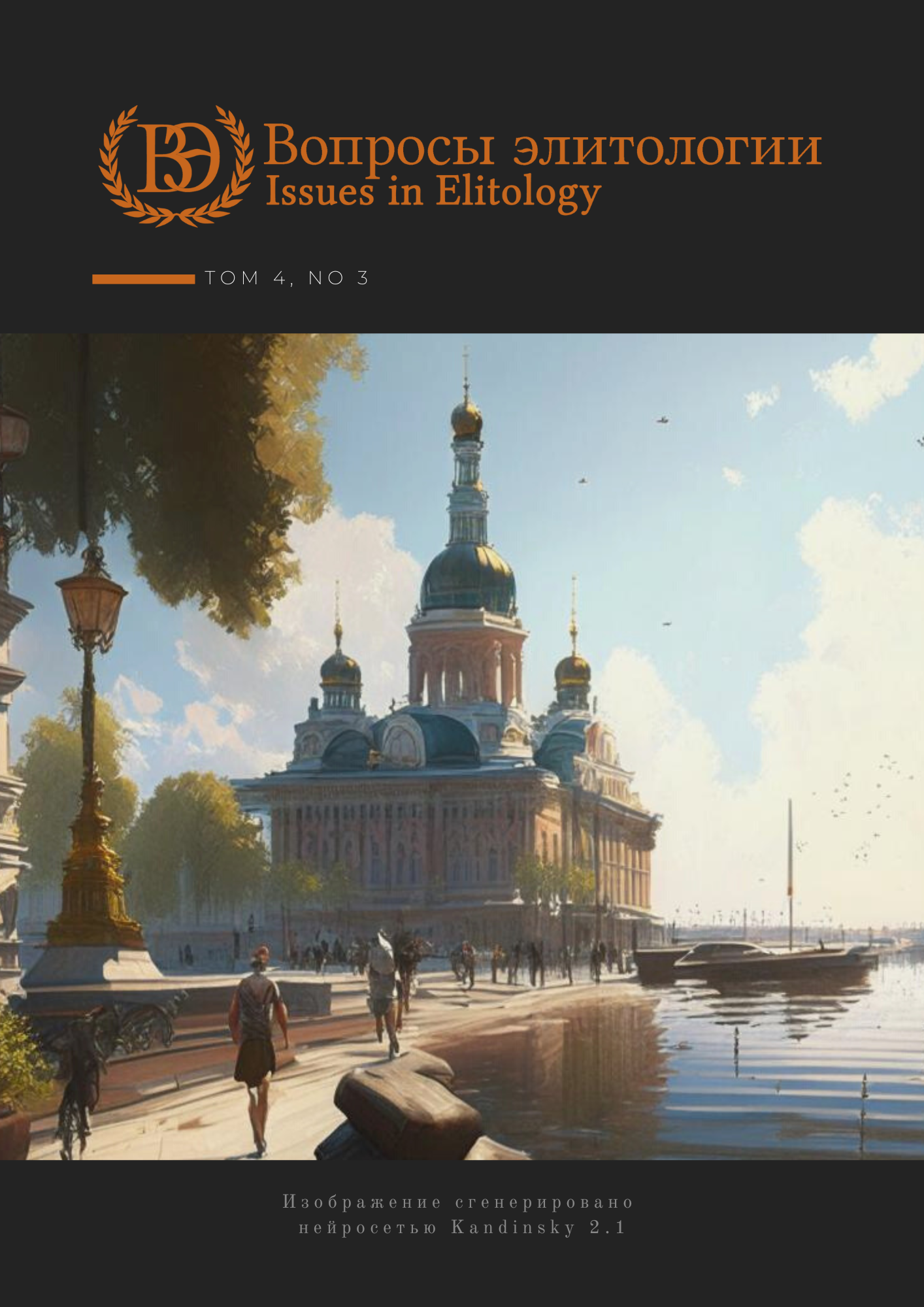Аннотация
Цель настоящей статьи – исследование базовых основ научно-методического аппарата оценки качества элит, предложенного университетом Санкт-Галлена (Швейцария), и его использование для сравнительных измерений качественного состояния национальных элит Европейского и Евразийского экономического союзов на основе ранжирования, входящих в них государств.
Основными шагами достижения цели являются процессы изучения: элит в современных социальных исследованиях, структурной оценки состояния элит, «барометра» как матрицы создания ценности, сравнительных характеристик элитного качества.
Результаты теоретического анализа подтвердили исследовательский интерес к данной проблеме, которая может рассматриваться как с формально-концептуальных (политических) позиций, так и в условиях фактического формирования многополярного миропорядка (геоэкономического положения). Контуры указанных измерений отличаются историческими процессами, типологией государств и современных элит, являющихся неоднородными и разновеликими, что допускает определенные оценочные условности.
Согласно приоритетным принципам формирования индекса качества элит и политико-экономической оценки воздействия элитного качества на общественное развитие, используется широкая комбинация разновеликих показателей, «доводка» которых осуществляется на основе экспертных оценок участников. Сравнительный анализ позволяет сделать вывод о субъективности и политизации, отдельных наиболее важных показателей. Поэтому предлагаемая методология нуждается в совершенствовании инструментария и использовании дополнительных оценочных компонентов, представленных, например, глобальными рейтингами по уровню процветанию, ВВП на душу населения и др.
Литература
Alexandrova, N. A. (2011). Status rent in the new political economy. Bulletin of N.A. Nekrasov KSU, 17(4), 15-20. (In Russian).
Amurov, M. A. (2020). Typology of modern political elites. Management Consulting, 5, 19-28 doi: 10.22394/1726-1139-2020-5-19-28 (In Russian).
BRICS Leaders' Meeting of the BRICS in an enlarged format. (2023). President of the Russian Federation. http://www.kremlin.ru/events/president/news/72089 (In Russian).
Casas, T., & Cozzi, G. (2021). Elite quality. Report 2021. Country scores and global rankings. Sustainable Value Creation - Fundamental issues for society Global metrics for long-term economic and human development. doi: 10.2139/ssrn.3845376
Casas, T., & Cozzi, G. (2023). Elite quality. Report 2023. Country scores and global rankings. The Sustainable Value Creation of Nations Measuring long-term economic and human development prospects.
Concept of the Foreign Policy of the Russian Federation, approved by the Decree of the President of the Russian Federation of 31.03.2023 No 229. (2023). President of the Russian Federation. http://www.kremlin.ru/acts/news/70811 (In Russian).
Extended meeting of the Presidium of the State Council on "On the Development of the Labor Market in the Russian Federation." (2023). President of the Russian Federation. http://www.kremlin.ru/events/president/news/72319 (In Russian).
Furs, S. P., & Fedoseev, A. A. (2021). Defining the elite quality index as a new type of social research. Culture and Security, 4, 5-10. https://doi.org/10.25257/kb.2021.4.5-10 (In Russian).
GDP per capita 1990-2022 (2022). Information on Nordic countries, Swedish and Norwegian language materials. https://svspb.net/danmark/vvp-stran-na-dushu-naselenija-wb.php (In Russian).
Georgieva, K. I. (2023). Fighting fragmentation where it matters most: Trade, debt and climate action, 16.01.2023. International Monetary Fund. https://www.imf.org/en/Blogs/Articles/2023/01/16/Confronting-fragmentation-where-it-matters-most-trade-debt-and-climate-action. (In Russian).
Glazyev, S. Y. (2018). A leap into the future. Russia in the new technological and world economic patterns. Knizhny Mir. (In Russian).
Golovin, V. G., & Golovina, E. E. (2021). Imperial ambitions of modern transnational corporations. Issues in Elitology, 2(3), 156-189. doi: 10.46539/elit.v2i3.77 (In Russian).
Golovin, V. G., & Golovina, E. E. (2022). Eurasian elites: State and prospects of development. Issues in Elitology, 3(3), 39-63. doi: 10.46539/elit.v3i3.116 (In Russian).
Golovina, E. E. (2020). Geoeconomics in the system of international relations. Internauka, 22(151), 64-66. (In Russian).
Grishin, S. Y. (2022). Transformation of the Russian socio-economic system in modern conditions. Izvestiya St. Petersburg State University of Economics, (6(138)), 91-96. (In Russian).
Held, D., Goldblatt, D., E., M., & J., P. (2004). Global transformations: Politics, economics, culture. Praxis. (In Russian).
Hunter, А. (2021). The World Economic Outlook database for April 2022—WEO groups and aggregates information. The UN List of Least Developed Countries as of November 2021. Wikimedia Commons. https://commons.wikimedia.org/w/index.php?curid=118625873
Karabushchenko, P. L. (2023). Elitology of creativity: The concept of creation of the good. Issues in Elitology, 4(1), 49-66. https://doi.org/10.46539/elit.v4i1.139 (In Russian).
Kazakova, V. I., & Novikova, M. N. (2009). Elite in the social space of modern Russia. Bulletin of Nizhny Novgorod University named after N. I. Lobachevsky. Series: Social Sciences, (1), 7-12. (In Russian).
Levina, E. I. (2009). The concept of "sustainable development": Main provisions of the concept. Bulletin of TSU, 11(79), 113-119. (In Russian).
List of developing, developed and undeveloped countries. (2021). NoNews | No News. https://nonews.co/directory/lists/countries/advanced-developing-market (In Russian).
Maruev, A. Y., & Evsyukov, A. A. (2018). Transnational corporations in the modern system of international relations. Vestnik of Moscow State University. Political Science, Ser. 12, (2), 93-102. (In Russian).
Rakhmanov, A. B. (2020). Business elites of the leading countries of the world in 2020: A comprehensive study . Bulletin of Tomsk State University Philosophy. Sociology. Political science, 56, 194-222. doi: 10.17223/1998863 (In Russian).
Ranking of the world's countries according to the index of the quality of elites. (2023). Center for Humanitarian Technologies. https://gtmarket.ru/ratings/elite-quality-index (In Russian).
Ranking of the world's countries by prosperity. (2023). Center for Humanitarian Technology. https://gtmarket.ru/ratings/legatum-prosperity-index (In Russian).
Schwab, K., & Mallere, T. (2020). COVID 19: The great reset. Forum Publishing. https://ekniga.org/dokumentalnaya-literatura/dokumentalistika/254193-covid-19-velikaya-perezagruzka.html (In Russian).
Sokolova, E. O. (2010). New Russian regional political elite. Megapolis Management, (4), 228-232. (In Russian).
UN. (2022). Department of Economic and Social Affairs, Population Division. World population prospects for 2022. https://population.un.org/wpp/Download/Standard/MostUsed/ (In Russian).

Это произведение доступно по лицензии Creative Commons «Attribution» («Атрибуция») 4.0 Всемирная.


